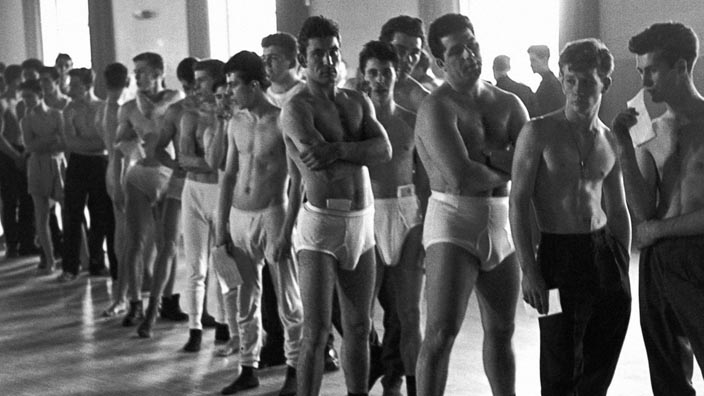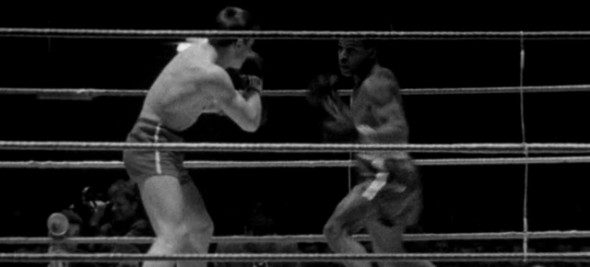In grainy black and white, half-naked boys and younger males type a line in a Montreal gymnasium. They’re lean and match, registration playing cards tucked into cosy white briefs pulled as much as their navels. A few of them pose for the digital camera. Daylight streams by way of home windows onto others who stare off at one thing, their shadows drawn to the point of interest. Do they see a approach out?

The digital camera winds by way of the road of youths. Younger males scowl whereas boys look scared; all of the whereas the vapid voice of a male narrator intones:
[w]hereas you settle for my registration, I, the undersigned, do hereby forgo, each for myself and my heirs or executors of my will, all grounds that I’ll have for grievance towards the organizers … pertaining to any accident to which I’ll fall sufferer on the event of this championship … In consideration whereof, witness my signature.
On “signature” the scene fades out by boring into the brow of one of many youngest on the finish of the road, the place his mind might quickly be pummeled right into a void. The narrator sounds bored as bare-faced boys brush by like chicks on a conveyor belt.

Now we’re in one other gymnasium, this one bigger and darker, as if contained in the cranium of the boy on the finish of the road. The fretful chord of an electrical guitar echoes as a highlight shines on a coach watching three fighters shadow-box in the course of the fitness center. Then one in all them punches on the digital camera simply as guitars and drums erupt. Translated under from the French, a male voice howls:
Joe, Joe, Joe, he’s very well-trained, He needs to be champion of the world; Joe, Joe, Joe, he actually likes his work, However what he likes most is to see his opponent flat on the mat.
The fighters variously skip rope, hit the punching bag, do leaping knee-lifts or bob their heads up and down, all in synchrony with the tune’s jubilant rhythm. Instantly the tune stops mid-stream and we reduce to a boy mendacity flat on his again. The shot zooms out and we see he’s simply stretching on a towel. He will get up and the 4 go away the fitness center, their footsteps dissolving as we reduce to a close-up of the highlight, which fades to black: just like the others in line Joe needs to be champion of the world, however as an alternative his ‘gentle’ is snuffed out.

With such deliberate choreography and modifying, Golden Gloves (1961) asks what it means to win at a sport designed for society’s losers. Boys of poor households think about beginner boxing is a approach out of poverty and into the skilled ring the place a million-dollar purse awaits.
We comply with two Montreal fighters coaching for a Golden Gloves championship. Ronald Jones, 20, baby-faced and black, lives in a tenement home along with his youthful brother and sister and his mom. For his breakfast she cracks an egg right into a pan of scorching bacon and grease. A chunk of eggshell falls in and she or he tries repeatedly to tug it out, however fails.
She serves Ronald the eggs and bacon. He grins and coos. Shifting as it’s to see how a lot mom and son love one another, he’s going to swallow eggshell. I’m made to surprise if her boy finally ends up a shell of a person, cracked and fried by the trials of the boxing world.

Meantime Georges Thibault, 26, flat-faced and white, is a waiter in a seedy men-only taverne, a type of sty or coop stuffed with “his mates, his supporters, his admirers.” Toothless and beak-nosed, they swill beer as cigarette smoke licks their greasy pompadours.
Georges explains how he obtained his begin in beginner boxing: “So I put the gloves on, see, and there’s this heavyweight … a fireman. He was on hearth after I’d completed with him, you guess.” His mates grunt their assent, then carry out “Operation Sizzling Seat,” setting hearth to a bit of paper slipped beneath the bum of a drunk dozing in a chair. He jumps up and squeals; they dump beer on his head and cackle.
Golden Gloves captures a bevy of particulars about Montreal’s beginner boxing setting within the early 60s. The movie judges neither the brutality of boxing nor a society that goads poor youths into losing one another within the ring. As a substitute, by way of a sequence of orchestrated pictures, I’m invited to look again fifty years and surprise how little has modified. —Marko Sijan

















